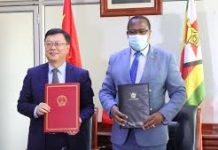Staff Report
ISLAMABAD: “Pakistan and China can produce high-grade sugar in abundance and export it across the world. What the two ‘iron brothers’ need to do is to enhance cooperation to uplift sugarcane industry in Pakistan,” Dr. Gu Wenliang, Agricultural Commissioner of the Chinese Embassy in Pakistan said.
“As the saying goes: ‘The friendship between China and Pakistan are higher than the Himalayas, deeper than the ocean.’ Sugarcane cooperation between China and Pakistan will bring sweet revolution to the iron brothers, and will literally turn the friendship between the two nations ‘sweeter than honey’,” he remarked.
Dr. Gu Wenliang was speaking at “China-Pakistan Sugarcane Industry Cooperation and Exchange Forum” held online where experts from both China and Pakistan participated and exchanged views.
“It is a great forum. Our responsibility is to connect people and experts from China & Pakistan and provide them a platform. This is what we are doing with zeal and zest. China and Pakistan should join hands to promote sugarcane production and processing to produce high-grade sugar.
Believe me, two iron friends can export sugar to the world if they enhance cooperation in this field,” he said, adding that the Chinese Embassy in Pakistan will continue connecting people from both sides. Mr. Liu Kui, Director of International Cooperation Department, Chinese Academy of Tropical Agricultural Sciences (CATAS), introduced different aspects of CATAS, and gave an impressive industrialization application of ‘Tissue Culture’ which, according to him, can bring revolution in the production of sugarcane.
“Chinese Academy of Tropical Agriculture Science has been giving training to the scientists across the globe. It has introduced 100 training courses for 4,000 participants from more than 90 countries.
More than 40 young scientists from Asia, Africa, and Latin America came to CATAS for medium and long term visits and exchanges,” he said, adding that CATAS has sent its experts to more than twenty countries to conduct agriculture technology guidance and demonstration of extension.
Liu said CATAS has been transferring technology and Pakistan can also benefit from it. “CATAS and agricultural enterprises at home jointly carry out international technology transfer,’ he said adding that the Plant Rapid Propagation Research Center of CATAS was established in 2003 and mainly engaged in plant tissue culture and in vitro conversation of tropical plants.






